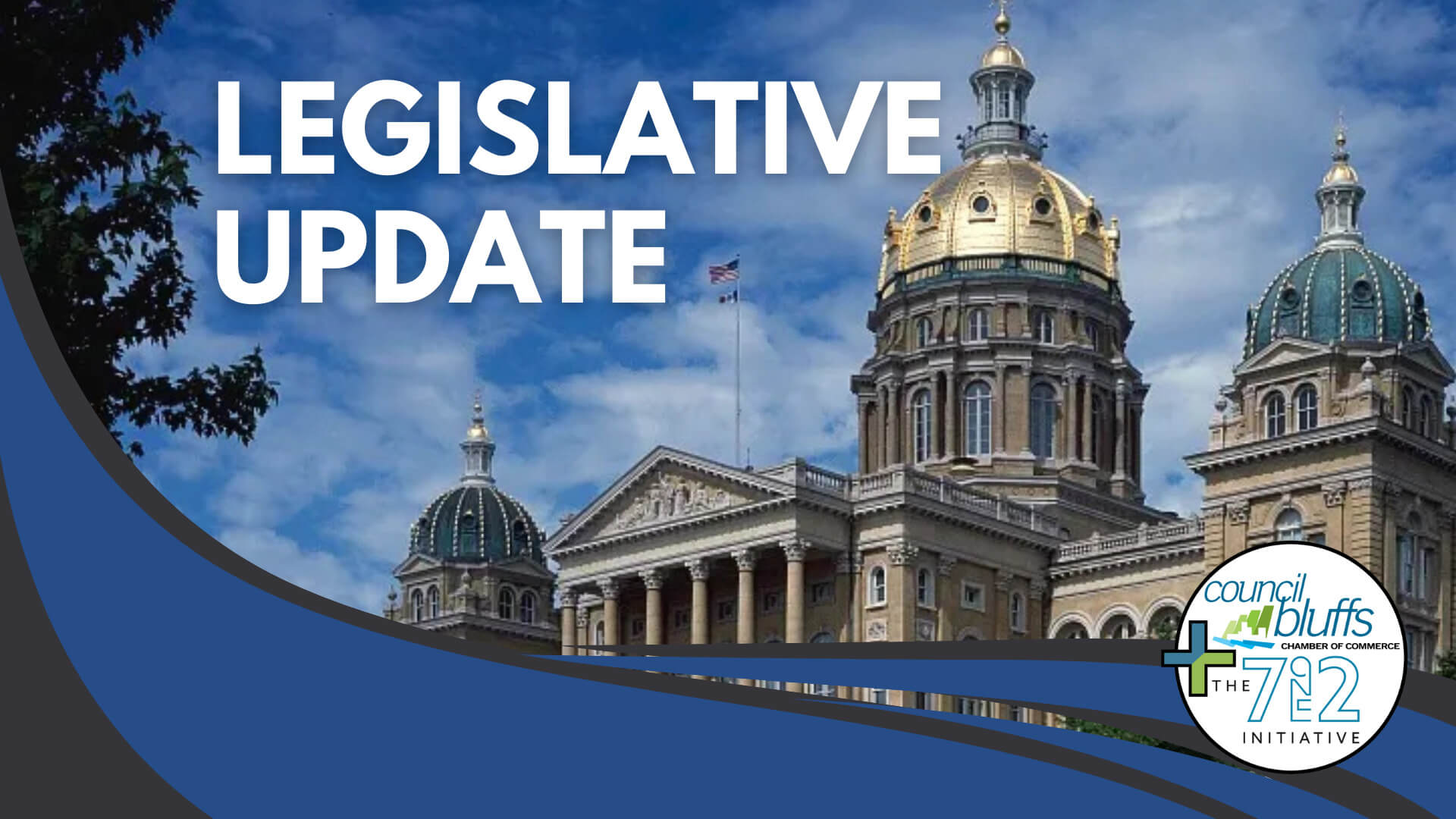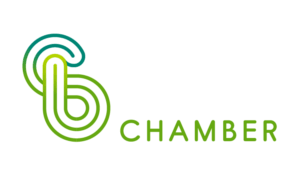May 19, 2025 Legislative Update

Members,
The Iowa Legislature adjourned sine die last week, concluding the 2025 session of the 91st General Assembly. The session began January 13 and resulted in the passage of 176 bills, 76 of which have been signed into law by Governor Reynolds as of this writing. The Governor has 30 days following adjournment to take action on bills passed in the final days of session.
Property tax relief was a priority for leadership throughout the session, along with a variety of reforms in healthcare, education, and workforce development.
Below is a summary of key developments that took place during the session, and updates on legislation with direct relevance to the business community and ongoing economic development efforts in our region.
Fiscal Year 2026 Budget
The state budget for FY26 totals $9.452 billion, using surplus funds from FY25 to close a projected $400 million revenue gap. The Revenue Estimating Conference forecasted $8.51 billion in revenue for FY26.
Governor’s Priority Legislation
The Governor’s legislative agenda this session focused on economic competitiveness, workforce access, and support for families. Several proposals passed both chambers and are now law; others failed to advance despite committee approval.
Bills That Passed
- SF 607 – Unemployment Insurance Reform: Reduces employer tax burden by adjusting wage base, rates, and contribution tables.
- HF 972 – Rural Healthcare Access: Expands access and funds recruitment and retention of rural physicians.
- HF 889 – Families First: Establishes paid parental leave for state employees—4 weeks for maternity, 1 week for paternity.
- HF 782 – Cellphone Use in Schools: Requires schools to implement policies limiting cellphone use during school hours.
- SF 619 – Disaster Assistance Loans: Provides loans for eligible housing projects following natural disasters.
- HF 784 – Math Proficiency Program: Invests in professional development to improve student math performance.
Bills That Did Not Pass
- SF 585 – Energy Reform: Would have established right-of-first refusal (ROFR) on transmission projects and required integrated resource plans.
- SF 445 – Childcare and Preschool Reform: Sought to expand public-private partnerships and enhance provider support.
- SF 295 – Wallace Building Sale: Would have authorized the sale of a state-owned building.
Civil Rights and Gender Identity
In February 2025, the Iowa Legislature passed Senate File 418, which was signed into law by Governor Reynolds on February 28. This legislation removes “gender identity” as a protected class under the Iowa Civil Rights Act, making Iowa the first state in the nation to repeal civil rights protections for a previously recognized group.
Supporters of the bill, including legislative Republicans, argued the change was necessary to reinforce prior state laws relating to public restroom use and participation in K-12 sports, and to reduce the likelihood of those laws being overturned in court.
Opponents, including legislative Democrats, civil rights organizations, medical associations, and advocacy groups, expressed strong concerns about the rollback of protections and its potential impact on discrimination, mental health, and Iowa’s national reputation. Critics also warned that the move could hinder efforts to attract and retain a diverse, inclusive workforce.
2026 Gubernatorial Race
In April 2025, Governor Kim Reynolds announced she will not seek re-election in the 2026 gubernatorial race, opening the field for new candidates in Iowa’s highest office.
Since the announcement, several prominent Republican figures have declared their candidacies, including State Senator Mike Bousselot, 4th District Congressman Randy Feenstra, and former State Representative Brad Sherman. Attorney General Brenna Bird is also reportedly considering a run. On the Democratic side, State Auditor Rob Sand has officially declared his candidacy for Governor.
Meanwhile, Lieutenant Governor Chris Couynor has filed paperwork to run for State Auditor in 2026.
Property Tax Reform
Property tax relief emerged as a top priority during the 2024 election, prompting early action by Senate and House Ways and Means chairs at the start of the 2025 legislative session. Although no final bill was sent to the Governor this year, lawmakers made significant progress on the issue.
Senate File 651 advanced out of committee in the final weeks of the session but did not reach the floor for debate. The bill proposed several major changes:
- Elimination of most property tax rollbacks, except for residential and agricultural classifications.
- Creation of a homestead exemption equal to 25% of a home’s value, up to $100,000.
- A phased residential rollback, beginning at 77.5% in year one and increasing 2.5% annually over ten years.
- A 2% revenue growth cap on local governments.
- Reduction of the uniform levy to $2.97.
- Streamlining of the school funding formula.
Although SF 651 did not advance, the legislature is expected to continue work on property tax reform during the interim and potentially take action in the 2026 session.
The Chamber supports continued efforts to create a more transparent, predictable, and equitable property tax system. Reforms must balance taxpayer relief with the need for local governments to invest in infrastructure, workforce, and essential services that sustain economic growth.
Casino Moratorium
HF 144 – Gaming License Moratorium: Passed the House but failed in the Senate. The Iowa Racing and Gaming Commission later approved a new license for the Cedar Crossing Casino in Cedar Rapids.
Tax Credits and Incentives Reform
SF 657 – Tax Credit and Incentive Reform Package: A major package of changes to Iowa’s economic development tools passed this session, with an emphasis on simplifying programs and directing resources toward business growth and housing development. The bill replaces several legacy programs and modifies existing ones to improve transparency, accessibility, and return on investment.
Key changes include:
- Replacement of High-Quality Jobs with the Business Incentives for Growth program ($50M)
- Creation of the Seed Investor Tax Credit ($10M)
- Adjustments to the Workforce Housing Tax Credit cap: $43M (FY26), $40M (FY27), reverting to $35M
- Establishment of a 2-year Iowa Film Production Incentive pilot program ($10M)
- Replacement or repeal of several other programs, including Research Activities, Endow Iowa, Assistive Device, and Employer Childcare Tax Credits
Pharmacy Benefit Manager Reform
SF 383 – PBM Reform Act: New regulations take effect July 1, 2025, aimed at protecting independent pharmacies and increasing transparency in pricing practices by PBMs. Provisions include limits on reimbursement practices and required dispensing fees for small pharmacies.
Eminent Domain
HF 639 – Pipeline Eminent Domain Restrictions: Passed with bipartisan support. Places new restrictions on the use of eminent domain for carbon capture pipeline projects. Awaiting final action by the Governor.
Final Thoughts
This session reflected a continued focus on reducing the tax burden for businesses and individuals while addressing long-term workforce and infrastructure needs. Legislation advancing rural healthcare access, reforming workforce development incentives, and adjusting unemployment insurance will influence regional competitiveness and labor force dynamics.
We appreciate our elected officials’ engagement this session and will continue to work with legislative and agency partners to advocate for policies that support growth in Council Bluffs and across southwest Iowa.
As always, please reach out to us with any questions or feedback. We’re here to ensure your voice is heard and your business is supported—at the Capitol and here at home.
Chris LaFerla
President & CEO
Council Bluffs Area Chamber of Commerce
